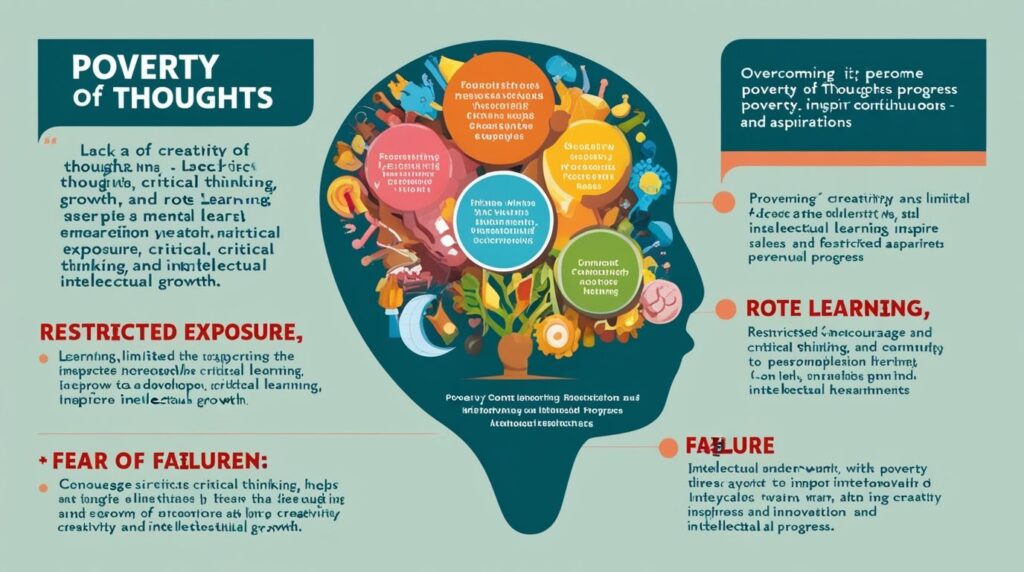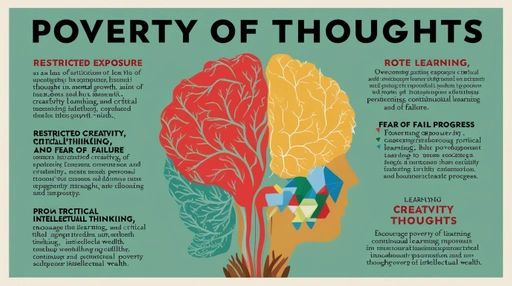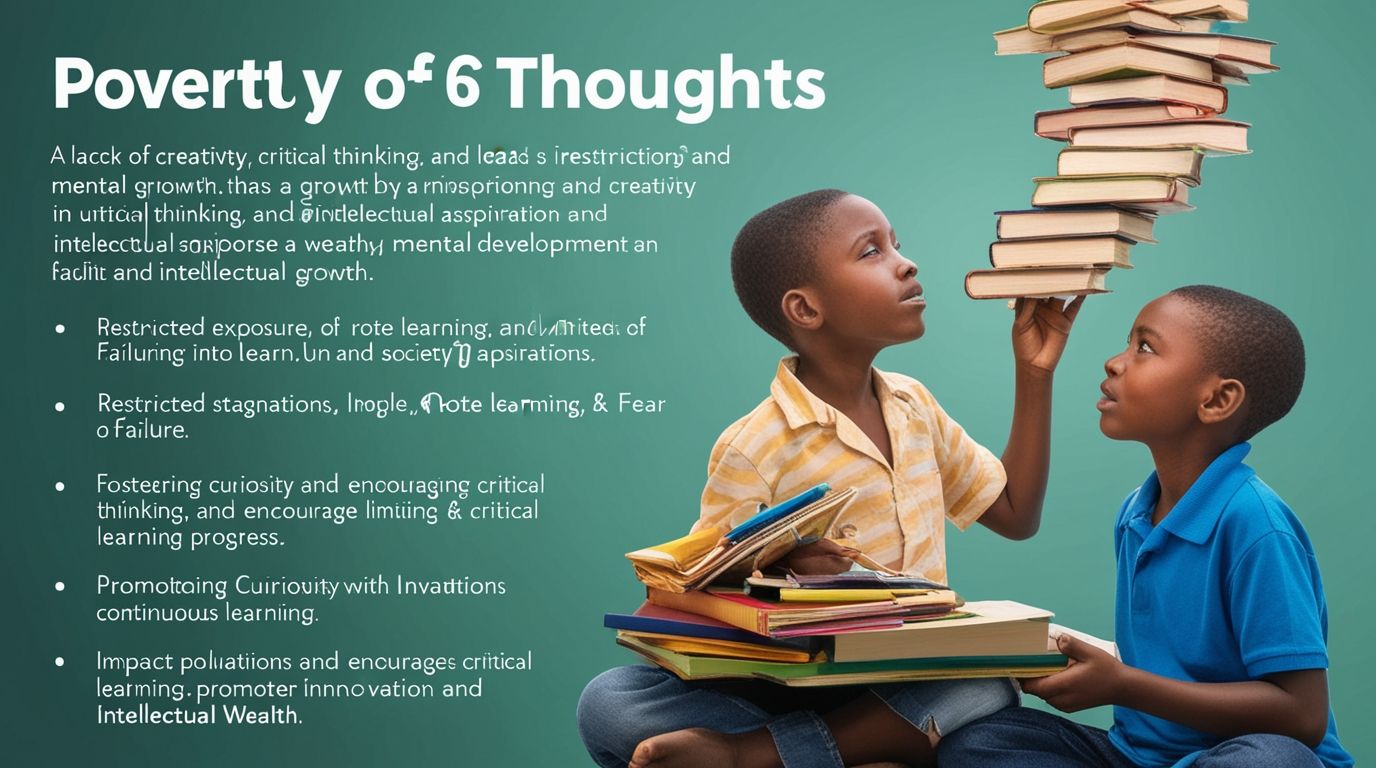Introduction
Poverty of thoughts is an intellectual deficit that limits a person’s ability to generate innovative ideas, evaluate situations critically, and envision positive possibilities. Unlike material poverty, which pertains to economic deprivation, poverty of thoughts highlights the absence of mental stimulation, curiosity, and intellectual engagement. This condition often results in stagnation, limited aspirations, and a lack of creativity. It obstructs personal growth and societal progress, creating barriers to mental expansion and problem-solving capabilities. In an age driven by information and knowledge, mental impoverishment is as detrimental as physical destitution. Understanding this concept is vital in addressing the root causes of intellectual stagnation and working toward cultivating an environment conducive to mental growth and development.
Causes of Poverty of Thoughts
One of the primary causes of poverty of thoughts is a lack of exposure to diverse perspectives and experiences. People confined to monotonous routines and homogeneous environments are less likely to develop the ability to think creatively. Education systems that prioritize rote learning over critical thinking further contribute to this condition. When individuals are not encouraged to question, analyze, and explore, they develop a passive acceptance of information, leading to intellectual stagnation.
Social and cultural influences also play a significant role. Societies that discourage questioning authority or promoting conformity can suppress independent thinking. Similarly, the dominance of social media and entertainment-driven content often overshadows thought-provoking material, promoting superficial engagement rather than deep reflection. Economic struggles also divert attention from intellectual pursuits, as survival instincts overshadow the desire for intellectual development.
Another contributing factor is the fear of failure. Many people hesitate to express their ideas due to the fear of being judged or criticized. This fear prevents them from engaging in meaningful discussions and exploring unconventional thoughts. Over time, this creates a mindset where safety and predictability are prioritized over creativity and exploration.

Consequences of Intellectual Poverty
The consequences of poverty of thoughts are far-reaching, affecting individuals, communities, and entire societies. At the individual level, it leads to a lack of motivation and ambition. People with impoverished thoughts often struggle to set goals, make decisions, and find purpose in their lives. They may also face difficulties in forming meaningful relationships due to a lack of emotional intelligence and communication skills.
On a societal level, intellectual poverty results in a lack of innovation and progress. Societies that fail to nurture critical thinking and creativity often lag in technological advancements, economic growth, and cultural development. Such communities are more susceptible to manipulation and exploitation, as their members lack the analytical skills necessary to question misinformation and propaganda.
Additionally, intellectual poverty perpetuates cycles of social and economic inequality. Those who lack the ability to think critically and adapt to changing circumstances are less likely to escape poverty, further widening the gap between different socio-economic classes. This imbalance creates instability, conflict, and dissatisfaction within societies.
Overcoming Poverty of Thoughts
Overcoming poverty of thoughts requires a multifaceted approach, starting with education. Schools and universities should emphasize critical thinking, problem-solving, and creativity rather than rote memorization. Incorporating debate, discussions, and project-based learning can help students develop the skills necessary for intellectual growth. Teachers should encourage curiosity and exploration, creating an environment where questioning is welcomed and valued.
Access to diverse resources is also essential. Libraries, online courses, and community programs should be made accessible to all, providing opportunities for continuous learning. Exposure to different cultures, philosophies, and perspectives through books, films, and travel can also broaden horizons and inspire new ways of thinking.
Promoting open communication and collaboration is another key strategy. Platforms for idea-sharing, brainstorming sessions, and mentorship programs can help individuals develop confidence in expressing their thoughts. Support groups and communities that celebrate creativity and innovation can further reinforce this mindset.
Mental stimulation should not be limited to formal education. Activities like puzzles, games, and storytelling can spark curiosity and improve cognitive abilities. Encouraging hobbies such as writing, painting, and music can also provide avenues for self-expression and intellectual engagement.

The Role of Technology
Technology can be both a contributor to and a solution for poverty of thoughts. While excessive reliance on social media and entertainment can hinder deep thinking, technology also offers tools for learning and development. Online platforms provide access to educational content, virtual discussions, and collaborative tools that can enhance intellectual growth. Artificial intelligence and data analysis tools enable better problem-solving and decision-making, provided they are used effectively.
However, it is essential to promote responsible use of technology. Users should be encouraged to seek meaningful content, engage in productive discussions, and avoid distractions that lead to superficial thinking. Digital literacy programs can help individuals maximize the benefits of technology while minimizing its negative impacts.
Encouraging Thought Leadership
Thought leadership is essential in combating intellectual poverty. Leaders, educators, and influencers should act as role models, promoting intellectual curiosity and innovation. Thought leaders can inspire change by sharing insights, challenging conventional norms, and addressing pressing issues through well-reasoned arguments.
Media and literature also play a crucial role in shaping public discourse. Thought-provoking books, documentaries, and articles can stimulate intellectual discussions and inspire new ideas. Encouraging storytelling and sharing personal experiences can make abstract concepts more relatable, fostering empathy and understanding.
Community engagement is equally important. Hosting seminars, workshops, and debates can provide platforms for idea exchange. Supporting local artists, writers, and creators can also contribute to a culture of intellectual enrichment.
Conclusion
Poverty of thoughts is an often-overlooked issue that impacts personal growth, societal progress, and global development. Addressing this challenge requires a collective effort to promote education, foster creativity, and encourage intellectual engagement. By creating environments that value critical thinking, exploration, and collaboration, we can break free from mental stagnation and build a future driven by innovation and progress.
It is imperative to recognize that intellectual wealth is not limited to formal education or economic status. It thrives on curiosity, openness, and the willingness to question and learn. As we strive to eradicate material poverty, we must also address the poverty of thoughts to ensure holistic development and a brighter future for all.

14 thoughts on “Poverty of Thoughts”
Comments are closed.